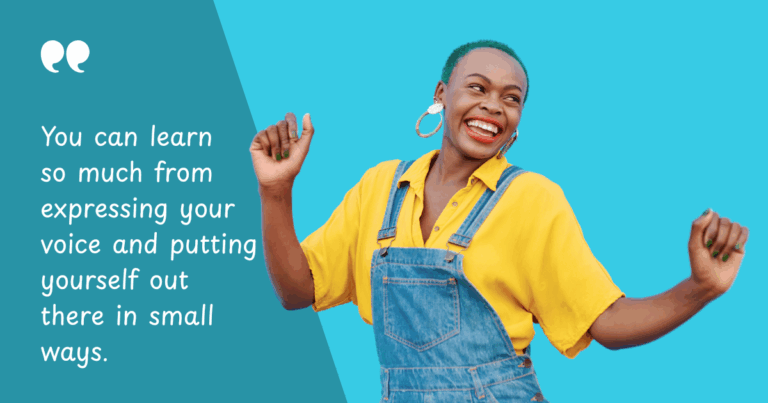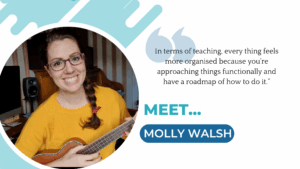Find out how four simple words could help singers banish self-doubt, build confidence and enjoy creative freedom.
⏱ 3 Minute Read
Confidence (or lack of it) is a common problem that holds back singers regardless of their age or ability.
So how can singing teachers help students develop self-belief and a growth mindset?
Vocal coach and podcaster Estelle Idoko believes she has the answer.
Addressing the Number 1 Singing Concern
As Estelle explains on the Singing Teachers Talk podcast, she’s developed a four-step framework to help singers build confidence.
She devised it in response to feedback from students, listeners to her podcast and singers in her Facebook group.
“The concern that is repeated over and over again, and the number one issue when students book a lesson, is confidence,” Estelle says.
“They say things like, ‘I just don’t feel confident in my voice’ or ‘I’m not confident in being on stage and performing in front of people’.”
Four words that serve as a guide to build confidence
Estelle developed the strategy after analysing her own creative journey.
She reflected on the habits and practices that had helped her develop as a singer, and read articles and watched videos on voice pedagogy.
“I realised I could distil it down to a few steps and into a framework that I could use to help singers walk through this path of building confidence,” she says.
The framework can be summed up in four simple words: Know, Practice, Express and Improve.
“This helps me as a singer, but it also gives me a framework for how I work with students, so I know where they are and where they need to be.”
Here’s Estelle’s framework to build creative confidence.
1 Know
Start by getting to know the voice.
“This can be split up into two parts – mindset and having a physiological understanding of your voice,” she says.
“Mindset-wise, you need to know your why. Know who you are as a singer, why you want to sing and what’s important to you.
“Then start to understand a little bit about your voice itself and how it works. Learn some anatomy if that’s helpful to you, and learn the mechanics of how your voice works.”
2 Practice
The next step is to put what you’ve learned into practice.
“Singing is muscle memory and about learning motor skills, so you need to start to practice,” she says.
Estelle encourages singers to establish a sustainable practice routine, even if it’s just five to ten minutes a day.
3 Express
“This is maybe my favourite part,” Estelle says.
“You’ve started to build awareness and learn about the voice as an instrument, and you’ve started to practise by setting up your routine.
“But you’ve got to start to put yourself out there because that’s really the test. You learn so much from expressing your voice and putting yourself out there in small ways.”
Whether it’s singing at an open mic night, joining friends for karaoke or treating your sister to a rendition of Happy Birthday, the critical thing is to do it.
4 Improve
The final step is to reflect on your performance and consider what you’ve learned.
Ask questions such as ‘What did I love about that?’, ‘What can I adjust?’ and ‘Where can I continue to grow?’.
“You kindly critique yourself and give yourself feedback about what you did well and what you can work on,” she says.
What next?
Once you’ve completed the four stages, it’s time to start all over again. (Remember, learning is a constant process of discovery.)
“Start to build awareness of that aspect of your voice [that you’ve identified needs developing],” Estelle says.
“Maybe you’re having a hard time with mixing in your second passaggio, so start working on improving that.
“You go back to building awareness. How are things working in that part of my voice? Right, I need to start working on coordinating my head voice and my chest voice, and maybe I need to work on vowel modification.
“Then you’re going to start to practise that and then put yourself out there again, and test it out. Then you evaluate, and the cycle repeats again.
“This whole process is how we build confidence as singers. I really believe in it.”
Listen
Check out our full interview with Estelle, where she also discusses:
- How she went from medical school to teaching singing.
- The importance of incorporating creativity into daily life.
Main image: Canva




